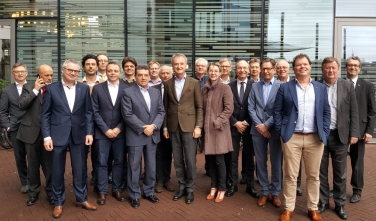
It’s been just a couple of weeks since The European Federation of Foundation Contractors (EFFC) held its Executive Meeting in Amsterdam.
Representatives from 10 National Federations attended the meeting and made a positive contribution to the work of the Federation.
Formed in 1989, the EFFC represents 16 Federations with more than 370 companies that undertake foundation construction and geotechnical processes. It works to promote the common interests of its members by improving the standard of workmanship, technical competence, safety and innovation for specialist foundation contractors across Europe.
In addition, the EFFC works to produce detailed guidance documents on a wide variety of topics such as health & safety, technical and contractual topics whilst also driving the development of technical execution codes in the European Ground Engineering sector.
Additionally the EFFC expresses the point of view of its members with the European Commission, authorities, professional institutions and other Federations and third parties.
Every Federation depends on the active work of its Members. In the case of EFFC the body managing the business of the Federation is the Executive Committee.
Now I cannot know for certain what people think about the work of a Federation? Opinions are varied I am sure and some even think we all meet up as an excuse to enjoy coffee and drinks. From time-to-time, talking to various people, I do hear that the work within the Federation is completely underestimated and in many cases not appreciated.
For this reason I feel it is important to disclose and showcase the work that people do, who have been nominated by their National Federations.
The Executive Committee consists of the Officers of the Federation, Chairs of the Working Groups and one Representative from each Full Member of the Federation.
The delegates who have been nominated by their National Federations represent their country’s interests. The Committee discusses the issues affecting the industry and seeks solutions to them. It also formally approves EFFC policies and position papers and reviews the work of the Federation. It also approves the Finances of the Federation.
The Executive Committee agrees the policy, strategy and objectives of the EFFC; discusses and agrees the budget and subscriptions; initiates, proposes and implements tasks for the future development of the EFFC; and transfers and disseminates the work of the EFFC to the National Federations.
To illustrate the magnitude of work and the variety of topics addressed, I am listing the topics that were being discussed during the Executive Meeting in Amsterdam:
REPORTS OF THE WORKING GROUPS
Contracts Working Group
Sustainability Working Group
Technical Working Group
Health & Safety Working Group
WORKING PLATFORM CERTIFICATE INITIATIVE
MUTUAL RECOGNITION OF RIG OPERATOR QUALIFICATIONS
RIG SAFETY STANDARD
FUTURE TASK GROUP WORK (Tremie Concrete, Carbon Calculator, Stabilising Fluids)
WEBSITE MATTERS
NEWSLETTER
FINANCIAL STATEMENT
COOPERATION WITH OTHER FEDERATIONS
Behind all these topics there are groups of people undertaking the detailed work on all of these issues and through their participation at several meetings throughout the year – they are the pulse of the Federation.
The challenges of the representatives of the Executive Committee is to make themselves familiar with these topics, its content, its meaning and impact for the Industry, the context of the topic in light of the European legislation and standards.
Whether Technical issues, Health & Safety or Financial issues, whether Legislative issues or European requirements, each member of the Executive must make themselves familiar with these topics. And this is a huge challenge, particularly for the smaller Federations that are not used to dealing with these issues in their National Federation. But at the end of all this is what the EFFC stands for – to promote the interest of its members.
Only the effective work of the members of the Executive Committee puts the Federation in a position to move forward and to achieve results that are appreciated by all members and contribute to further development.
I fully understand that sometimes things just need time, although I prefer effective working and on-time delivery of results, and therefore I wish to express my thanks to all my colleagues in the Executive Committee in particular, in the Officers’ Group and in the Working Groups and Task Groups for their individual contributions, their individual efforts and individual attachment to EFFC.
The President
